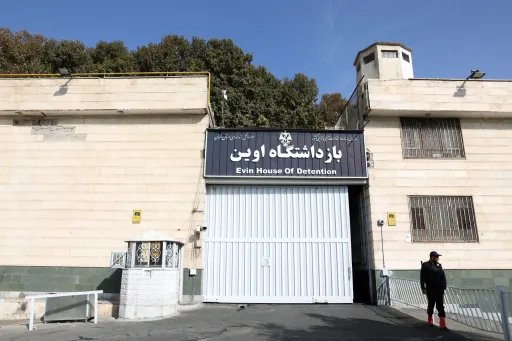Human Rights Watch alleged Thursday that an Israeli air strike on a notorious Iranian prison was “an apparent war crime”, while also accusing Tehran of harming and disappearing prisoners after the attack.
Israel struck Evin Prison in Tehran, one of Iran's most notorious detention facilities for political activists and dissidents, on June 23, during its 12-day war with the Islamic Republic.
The strikes during visiting hours hit Evin Prison’s main southern entrance, another northern entrance and other areas of the complex, destroying buildings that had medical facilities and prison wards.
The Iranian authorities initially said at least 71 people were killed during the air strike, among them civilians, including inmates, visiting relatives, and prison staff. Iranian media later raised that number to 80.

It was unclear why Israel targeted the prison.
Human Rights Watch said the attack was “unlawfully indiscriminate” and that there was no evidence of a warning or a military target before striking the prison complex, which it estimated holds over 1,500 prisoners.
“To make matters worse, Israeli forces put at grave risk prisoners who were already victims of Iranian authorities’ brutal repression,” said Michael Page, the rights group’s deputy Middle East director.
Human Rights Watch claims that prisoners were subject to “ill-treatment and violence” both as they were being taken out of the prison following the attack and as they were returned.
Calls to Iranian authorities were not immediately returned on Thursday, a public holiday in the country. The Israeli military also did not respond to an immediate request for comment on the Human Rights Watch reports.
After the attack, Iranian authorities evacuated and transferred the prisoners to two other facilities in Tehran province and said on August 8 that they were gradually returned. Iranian state media said the prisoners were transferred peacefully and without any conflict.
In conflicting accounts, relatives and Human Rights Watch alleged that some political prisoners were beaten with batons and “electric shock weapons” for resisting wearing handcuffs and protesting prison guards separating death-row inmates.
The group claimed that some of the prisoners have disappeared, including Swedish-Iranian doctor, Ahmadreza Djalali, who is at risk of execution. It also accused Iran of refusing to give them any information about his whereabouts.
“Iranian authorities should not use Israel’s strikes on Evin prison as another opportunity to subject prisoners, including those who should never have been in prison in the first place, to ill-treatment,” said Page.
The war in June, which killed about 1,100 people in Iran and 28 in Israel, started after Israeli jets struck key nuclear and military facilities. Iran, in retaliation, launched a barrage of missiles over Israel.




















